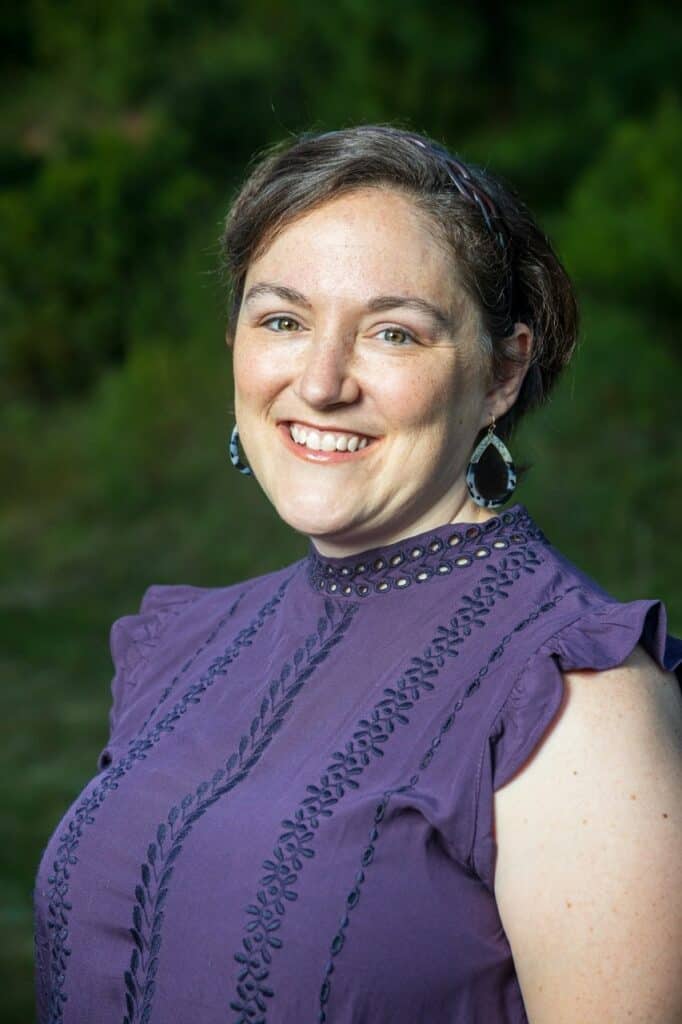
As an orthopedic physician assistant and mother of a 6-month-old, Katie Mackin thought physical therapy would help her persistent back pain. When the pain grew worse, an MRI and biopsy revealed she had HER2-positive metastatic breast cancer (MBC), which had spread to her spine. Katie was diagnosed with MBC, the most advanced form of breast cancer, at 34 years old.
“The MRI found that I had multiple metastases within several of my vertebrae on my spine,” Katie said. “My doctors told me that I could become paralyzed if I had surgery to remove the tumors and stabilize my spine, but doing nothing had a higher risk of paralysis, so I chose surgery.”
Katie successfully underwent surgery to stabilize her spine at Duke Cancer Canter in February 2018. Following radiation therapy and chemotherapy, Katie started taking trastuzumab (Herceptin) and pertuzumab (Perjeta) in three-week intervals. She went back to work part-time five months after her surgery.
“Around the time my son was starting to learn to walk, I was also rehabbing from that surgery and learning to walk again as well,” Katie said. “I’ve been stable since August 2018. I’m back to work fully and essentially back to as normal as life can be with MBC.”
At this time, MBC can’t be cured, and Katie feels uniquely positioned as someone living with MBC and a health care professional to use her voice as an advocate for furthering research to find cures that will one day end the disease.
“For those of us who are stable and in a position where we can help, we’ve got to help,” Katie said. “The fact that we’re living in 2022 and there still aren’t cures for MBC is atrocious. These are young, promising women who have families and lives and are contributing to society, and they’re stolen from us by MBC because the research is not where we need it to be.”
Katie believes more research initiatives are needed to find cures for MBC, like the Susan G. Komen® Metastatic Breast Cancer Collaborative Research Initiative (MBCCRI), which brings together researchers at Duke Cancer Institute and UNC Lineberger Comprehensive Cancer Center to find breakthrough discoveries for MBC cures.
“Having patient advocates be involved in research grants is a really important step because we need research that’s actually going to impact our lives. We need research that will result in treatment options that give us progression-free survival for years, not just a month here or a month there. We are grateful for any time we get, but we need treatments that offer real, meaningful time,” Katie said.
“We also need treatments that have fewer side effects because half the battle is sometimes these treatments are so caustic or toxic that you are feeling miserable. By the time you start feeling good again, it’s time for your next dose, which is not really any way to be living.”
Katie said she is fortunate that her husband Guillermo supports her endeavors in the MBC research and advocacy communities, having lost his mother to triple negative breast cancer four years before Katie’s diagnosis.
“There are only so many hours in a day,” Katie said. “If I didn’t have a husband that was very supportive of things that I’m passionate about, I wouldn’t have enough time to be a research advocate, especially as a full-time mom and essentially a full-time cancer patient.”
Learn more about the Susan G. Komen Metastatic Collaborative Research Initiative here.



